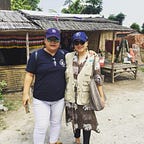Facing the coronavirus in Bangladesh
The World Food Programme puts women and children at the heart of both its short-term and long-term response
“I have an eight-month child and my husband who worked as a truck driver has lost his work because of this coronavirus,” says Shahnaz Begum. “We do not know how we will survive.”
The strain of the hardships her family of five face flits through her eyes— barely having enough food to eat and not knowing when things will turn around. She is not alone. More than 30,000 people living in Bashudepur village in the district of Rajshahi are struggling to meet their basic needs.
Bangladesh, a country of 160 million people, there have, at the time of publishing, been 228 deaths from COVID-19 with 14,657 confirmed cases — these figures are rising.
With plans to extend the ‘general holiday’ — as the lockdown is known here — the usually bustling country is set to remain at a standstill. Incomes have been cut by 70 percent due to the pandemic. “Many people in our village have lost their jobs,” says Shahnaz.
With only 15 percent of Bangladeshis earning more than US$6 a day, the livelihoods of millions are at risk — not least the 2 million people work for the garment industry.
With Eid-Ul-Fitr — a day of festivities — marking the end of Ramadan on 23 May, most are staying home, unemployed and facing uncertainty.
“Now, all we can rely on is the monthly cash we receive from this programme for my food so that I can breastfeed my baby properly,” says Shahnaz. “We have also borrowed some money so we can get by”.
Through the World Food Programme’s Mother and Child benefit programme, over a million pregnant and nursing mothers receive a monthly allowance of US$9 to help meet both their own basic nutritional needs and their young children’s. WFP works with Bangladesh’s Ministry of Women and Children Affairs to disburse this payment through G2P (Government to Person), a digital platform where top-ups reach their mobile phones or bank accounts every month.
Young women suffer from high rates of anaemia and other forms of malnutrition, while they tend to get married at a young age. It is critical for women to eat nutritious foods, especially during pregnancy and while breastfeeding, as both strongly contribute to the physical and cognitive development of the infant.
Important information pertaining to nutrition and healthy eating during and post-pregnancy is provided by WFP to those enrolled in the programme. Malnutrition is estimated to cost Bangladesh more than US$1bn every year in lost productivity.
“With skyrocketing food prices, and disrupted supply chains people from vulnerable groups will no longer have the purchasing power to access to food,” says Richard Ragan, WFP Bangladesh Representative and Country Director. “We are doing everything we can, from using digital technology to providing take-home rations, so that people have food and are less susceptible to diseases and malnutrition”.
The Government is working around the clock to distribute information on COVID-19 symptoms and prevention methods.
“At the moment we are providing online training to Upazila Women Affairs Officer to scale up the programme and encourage eligible women to enrol into this programme through the self-enrollment process so that no woman is left behind, especially during this time of COVID-19 crisis,” says Masing Newar, WFP Programme Officer.
To date, cases of COVID-19 have been confirmed in 63 out of the 64 districts in Bangladesh. The Labour Force Survey conducted in 2016–17, found that out of the total 61 million employed labour in the country, 85.1 percent work in the informal sector; where 91.8 percent were females were involved in informal employment.
Most people involved in the informal sector are currently out of work, which includes women, and they are silently bearing the brunt of economic turmoil. Programmes such as the Mother and Child Benefit provides support not only during regular times but also during times of crisis.
